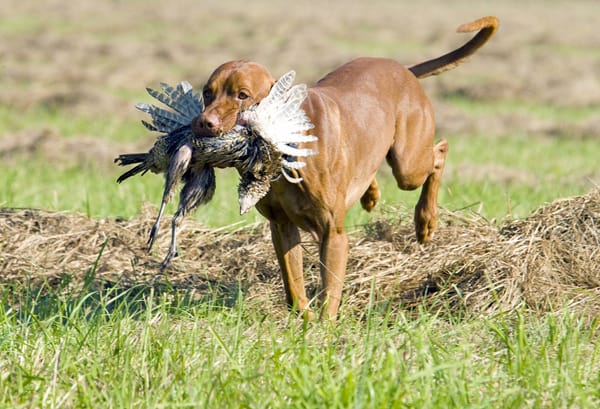
Hunting behavior of dogs
Many owners have watched their dog track, chase (or at least try to) and catch mice, birds, squirrels, cats… the list goes on. Why do dogs act like this and is it possible to somehow influence such actions?
Contents
What is the hunting behavior of dogs
Dogs are something of a mixture of scavengers and predators. This self-determination is sewn into them so deeply that it dictates behavior in many situations. And sometimes it gives us, the owners, problems.
Unfortunately, people often forget about the origin of dogs. The hunting behavior of cats is more or less recognized, and even then not by everyone. But dog owners are often horrified by the fact that their pets are chasing or even killing small animals.
Hunting behavior of dogs is the norm. This is part of the species behavior. Another thing is that different dogs show its different elements (search, sneaking, chasing or throwing, biting, killing, gutting, eating the victim) and to varying degrees. It is determined by the genes. And that is why, like any innate behavior, it is quite difficult to correct. However, we will return to this later.
Hunting behavior should not be confused with aggression. Yes, it looks exactly like that, but think: when you sink your teeth into an apple, do you feel hostility towards the fruit? I don’t think so. So the dog is not at all hostile towards a mouse that has just been dug out of a hole. And the fact that we constantly “attack” vegetables, chops or cakes does not mean at all that tomorrow we will attack one of the household members or colleagues.
The purpose of aggression is to keep the enemy away from you or from a valuable resource. The purpose of the hunt is to track down, catch up and get a stimulus that seems very important to the dog. So hunting for mice or birds does not mean at all that at night the dog will try to bite you in his own bed, as some owners fear.
There are dogs that have preserved the entire chain of hunting behavior, from tracking prey to eating it. And there are those who manifest one of the elements (for example, they can chase the victim, but, having caught up, they don’t know what to do with it). By the way, the shepherd’s behavior is part of the hunting behavior, but, of course, without the “final act” (murder followed by gutting and eating).
What to do if the hunting behavior of dogs takes on unwanted forms
Just because a dog’s hunting behavior is natural doesn’t mean it will please the owner. And that’s okay too. Not many people like to see their beloved pet kill another animal. Or headlong rushes after the victim, not understanding the road and not paying attention to your calls of appeal. But, since this behavior is innate, simply “turning it off” will not work. Does this mean that absolutely nothing can be done? Of course not.
Completely remove the hunting behavior, as I mentioned, will not work. Moreover, working with him is not very easy. But learning to control – at least to a certain extent – is possible. How to do it? Working with hunting behavior includes the following elements:
- Ensuring basic well-being (5 freedoms). After all, if the conditions of the dog’s life are abnormal, it is dishonest to demand from him to behave “normally”. Without this, no work is simply impossible.
- Use of controls to prevent self-reinforcement. After all, every time a dog succeeds in hunting, it receives a powerful reinforcement. And this behavior is getting stronger and stronger. Controls will help you prevent this from happening. Please note, however, that controls must be humane. Otherwise, not only will you not solve the problem with unwanted hunting behavior, but you will also get a lot of additional problems.
- Work on the balance of excitation and inhibition, on the dog’s ability to calm down quickly. There are special exercises that help teach your dog this valuable skill. It also requires the ability to relax on cue (and this is where relaxation protocols come in handy).
- Strengthening contact with the owner. After all, the better the contact, the more motivation the dog has to make a choice in your favor in any incomprehensible situation.
- Teaching self-control skills. There are special exercises that help a four-legged friend learn to keep himself in his paws.
- Providing an optimal level of activity, satisfying the need to hunt in an acceptable way. Special games, exercises, perhaps, classes in a suitable kind of cynological sport help to direct energy in a constructive direction and reduce the motivation to hunt “unauthorized”.
It is unlikely that you will be able to learn to control the hunting behavior of a dog in one sitting. This requires systematic, consistent work. If you understand that you cannot cope on your own, do not hesitate to seek help from specialists who work with humane methods.





